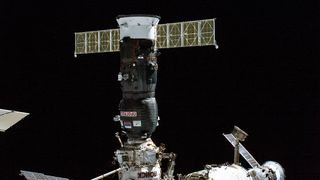
For the second time in two months, a Russian spacecraft docked with the International Space Station (ISS) has sprung a leak.
Mission controllers in Moscow have noticed "a depressurization" in the robotic Progress 82 cargo craft, Russia's federal space agency Roscosmos announced on Saturday (Feb. 11).
The depressurization occurred in the Progress vehicle's coolant system, NASA officials said.
"The reason for the loss of coolant in the Progress 82 spacecraft is being investigated. The hatches between the Progress 82 and the station are open, and temperatures and pressures aboard the station are all normal," NASA officials wrote in a blog post on Saturday. "The crew, which was informed of the cooling loop leak, is in no danger and continuing with normal space station operations."
Related: Hole in leaky Soyuz spacecraft not caused by Geminid meteor
Progress 82 arrived at the ISS on Oct. 28, 2022 and was scheduled to depart on Feb. 17. It's unclear if the freighter will still leave on that date or if mission controllers will keep it around longer than originally planned to continue the leak investigation. (Progress vehicles are designed to burn up in Earth's atmosphere when their missions are over, so engineers won't be able to examine the vehicle on the ground.)
Coincidentally, the depressurization was noticed on the same day that another Russian freighter, Progress 83, arrived at the orbiting lab. Progress 83 docked successfully early Saturday morning, unaffected by the travails of its sibling ship.
Get the Space.com Newsletter
Breaking space news, the latest updates on rocket launches, skywatching events and more!
Progress 82's leak follows on the heels of a similar incident involving Russia's MS-22 Soyuz spacecraft, which carried three astronauts to the International Space Station in September and was supposed to haul them home again in March.
But Soyuz MS-22 leaked away all of its coolant on Dec. 14, a dramatic event that Russian mission controllers eventually traced to an apparent micrometeoroid strike. The vehicle is now unfit to carry astronauts except in case of an emergency aboard the ISS, so Roscosmos plans to launch another Soyuz later this month to take its place.
That replacement Soyuz, known as MS-23, will launch uncrewed. It will bring the MS-22 crew — cosmonauts Dmitri Petelin and Sergey Prokopyev and NASA's Frank Rubio — back to Earth, likely in late September.
That's the current plan, anyway. It's unclear at the moment if Roscosmos and the other space station partners will adjust it, perhaps to allow more time to conduct a Progress leak investigation and consider the implications of its results.
Mike Wall is the author of "Out There" (Grand Central Publishing, 2018; illustrated by Karl Tate), a book about the search for alien life. Follow him on Twitter @michaeldwall. Follow us @Spacedotcom, Facebook and Instagram.
Join our Space Forums to keep talking space on the latest missions, night sky and more! And if you have a news tip, correction or comment, let us know at: community@space.com.

Michael Wall is a Senior Space Writer with Space.com and joined the team in 2010. He primarily covers exoplanets, spaceflight and military space, but has been known to dabble in the space art beat. His book about the search for alien life, "Out There," was published on Nov. 13, 2018. Before becoming a science writer, Michael worked as a herpetologist and wildlife biologist. He has a Ph.D. in evolutionary biology from the University of Sydney, Australia, a bachelor's degree from the University of Arizona, and a graduate certificate in science writing from the University of California, Santa Cruz. To find out what his latest project is, you can follow Michael on Twitter.
-
Unclear Engineer That seems like a very low probability coincidence for random strikes by space junk or natural meteoroids. Unless there is a constant barrage of impacts that usually don't do significant damage and we just aren't told about that. In that latter case, the vulnerability of the various systems could make sense for something like the the cooling systems to be repeatedly damaged if they have the highest probability for being damaged.Reply
So, does anybody know the frequency of non-damaging strikes on the ISS? If it is significant, I would expect there to be some good data from the effects on those huge solar cell arrays, which have a lot more area than the cooling pipes in Russian space vehicles.
There are some other reports of strikes, such as https://www.nbcnews.com/science/space/space-junk-damages-international-space-stations-robotic-arm-rcna1067
and https://www.snexplores.org/article/space-trash-kill-satellites-space-station-astronauts
The second link states "Astronauts have visited and repaired the telescope multiple times in the last three decades. Each time they have found hundreds of tiny craters in the solar panels. These were left by collisions with small pieces of debris. Scientists have been logging the pattern and incidence of these impacts. That data will help the scientists build computer models that predict not only how many tiny pieces remain in orbit, but also where they are."
So, this does sound like a barrage situation. -
Jan Steinman Reply
When you look at what a mess the supposedly "powerful" Russian military has shown itself to be in Ukraine, I would be surprised if Russian spacecraft didn't have problems!Unclear Engineer said:That seems like a very low probability coincidence for random strikes by space junk or natural meteoroids…
So, this does sound like a barrage situation.
I think what we're seeing is a "barrage" of corruption and idiocy here. As with the military, it's showing up with symptoms of "deferred maintenance." -
Pogo Note that every country that has a space program has its failures, seems to be Russia's turn now. This one, the one where the Russian craft had a thruster stuck open and the ISS went into a spin, and several failed to achieve orbit. But NASA had Gemini VIII with thruster failure, Apollo 1 fire, Apollo 13 explosion, Challenger, Columbia, as well as a number of unmanned stuff.Reply
